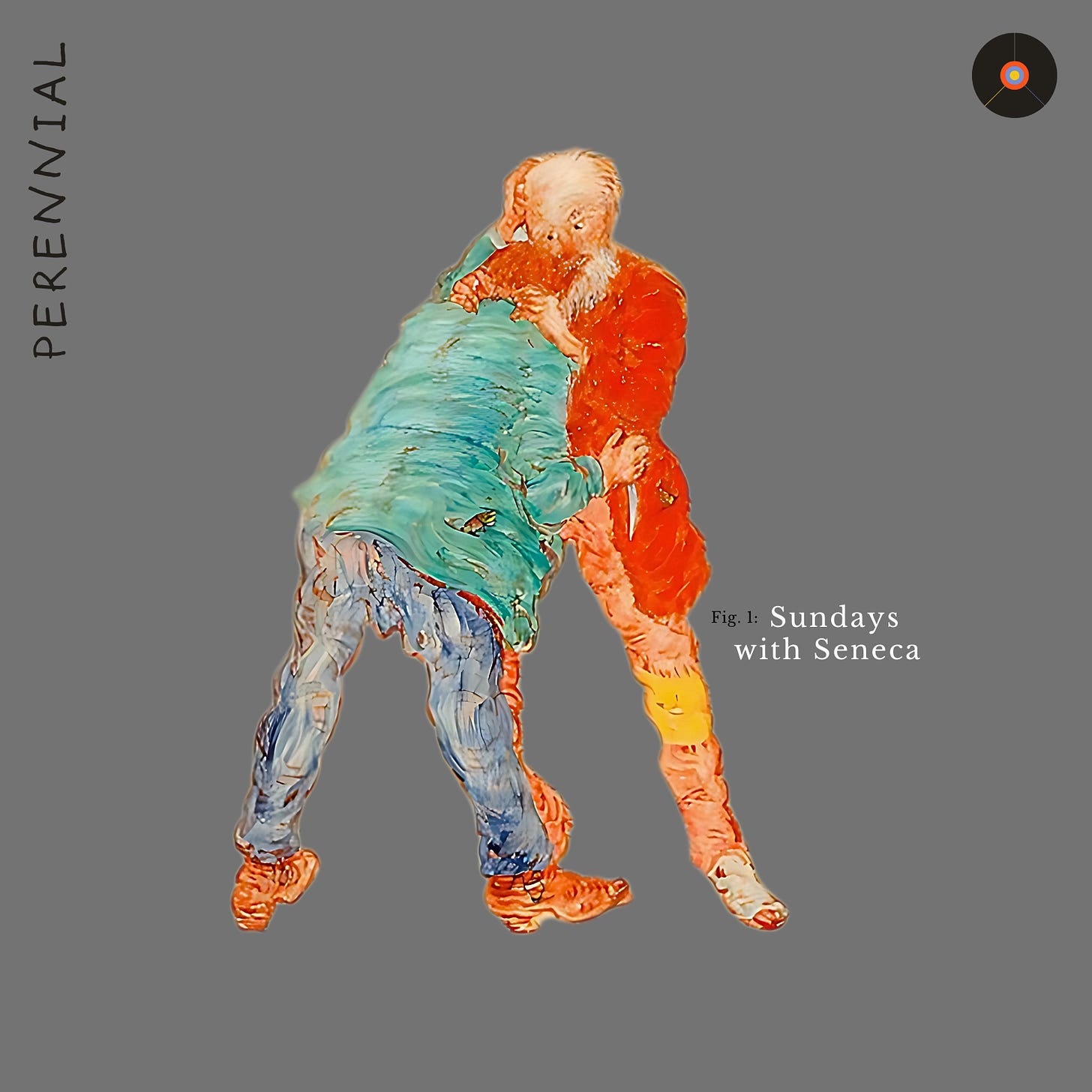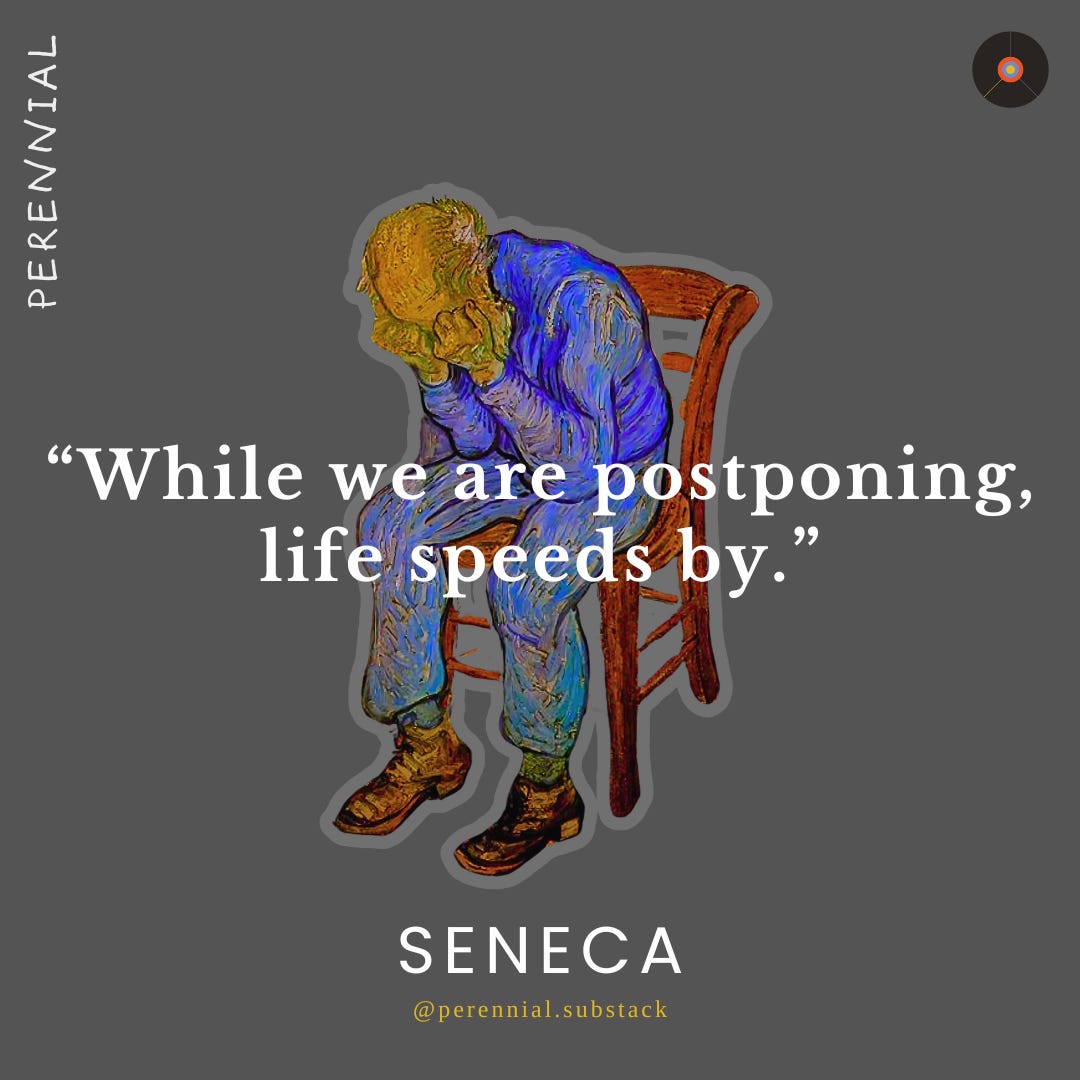Dear Readers & Listeners,
A quick note: Welcome back to the Sundays with Seneca series. After a bit of a break from the audio portion — I’m excited to share the way forward. Sundays with Seneca and the Dying Every Day series will now be delivered via the Perennial Meditations podcast. I’m sharing this one with all subscribers, but most episodes will be exclusively available to members.
As a reminder, if you’re interested in becoming a member, there are multiple options: (1) Become a member at $5 a month or $39 for the year; (2) If you need a little assistance, you can use this 50% discount link; or (3) If you are unable to afford it — please accept a complimentary membership.
You can listen to the Perennial Meditations podcast here on Substack, Apple Podcasts, Spotify, or wherever you get your podcasts. If you enjoy it, please take a moment to subscribe and give it a 5-star rating; it helps others find it.
Thank you for reading, listening, and dedicating your time to the art of living!
🏛️ Sundays with Seneca
Sundays with Seneca is a weekly series exploring Lucius Annaeus Seneca’s writings and Stoic philosophy. Each meditation includes selected passages from one of Seneca’s letters, searching for ancient lessons on the art of living.
Listen on Apple Podcasts, Spotify, or YouTube.
Seneca on the value of time
In this week’s Sundays with Seneca series, we’re exploring selected passages from a letter known today as On Saving Time.
My dear Lucilius—set yourself free for your own sake; gather and save your time, which till lately has been forced from you, or filched away, or has merely slipped from your hands. Make yourself believe the truth of my words—that certain moments are torn from us, some are gently removed, and others glide beyond our reach. However, the most disgraceful kind of loss is due to carelessness. If you pay close attention to the problem, you will find that the largest portion of our lives passes while we are doing ill, a good share while we are doing nothing, and the whole while we are doing that which is not to the purpose.
Seneca asks Lucilius,
What man can you show me who places any value on his time, who reckons the worth of each day, who understands that he is dying daily? (Consider taking a moment to reflect on the question yourself.) We are mistaken when we look forward to death; a significant portion of death has already passed. Whatever years behind us are in death’s hands.
Therefore, Lucilius, do as you write me that you are doing: hold every hour in your grasp. Lay hold of today’s task, and you will not need to depend so much upon tomorrow’s. While we are postponing, life speeds by.
Seneca stresses,
Nothing, Lucilius, is ours except time. We were entrusted by nature with the ownership of this single thing, so fleeting and slippery that anyone who will can oust us from possession. What fools these mortals be! (Seneca is also referring to himself.) They allow the cheapest and most useless things, which can easily be replaced, to be charged in the reckoning after they have acquired them. Still, they never regard themselves as in debt when they have received some of that precious commodity—time! …
You may desire to know how I, who preach to you so freely, am practicing. I confess frankly: my expense account balances are as you would expect from one who is free-handed but careful. I cannot boast that I waste nothing, but I can at least tell you what I am wasting and the cause and manner of the loss; I can give you the reasons why I am a poor man. My situation, however, is the same as that of many who are reduced to slender means through no fault of their own: everyone forgives them, but no one comes to their rescue.
Seneca concludes,
What is the state of things, then? It is this: I do not regard a man as poor if the little which remains is enough for him. However, I advise you to keep what is yours; you cannot begin too early. As our ancestors believed, it is too late to spare when you reach the dregs of the cask. Of that which remains at the bottom, the amount is slight, and the quality is vile. Farewell.
Follow Us: Instagram | Youtube
Reflection Prompt
As a reflection exercise, consider contemplating (or journaling) on the subject of time. It’s easy to view time as if you’re on the bank of a river, watching it go by. But the truth is our lives are thrust into the river of time. There is no going back to days or moments past and no going ahead, for that matter. It’s sort of like a roller coaster — we only get off when the ride is over.
But this need not be a cause for anxiety.
In his book Four Thousand Weeks, Oliver Burkeman (a previous podcast guest) writes, “The average human lifespan is absurdly, terrifyingly, insultingly short. But that isn’t a reason for unremitting despair or for living in an anxiety-fueled panic about making the most of your limited time. It’s a cause for relief.”
A wise perspective regarding the value of time provides clarity. And clarity reduces anxiety and helps us realize what truly matters in daily life. As you navigate your week, consider asking yourself, “How can I remember that nothing is mine except time?”
—
Thank you for reading; I hope you found something useful.
Until next time, be wise and be well,
J.W.
P.S. New here? Catch up on previous volumes in the archive!














Seneca on the value of time